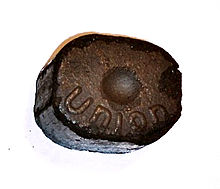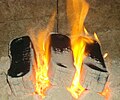Union briquette
Union briquettes are briquettes made from lignite , mined in the Rhenish lignite area in the Cologne Bay .
history
The industrial mining of brown coal in the Ville began in the second half of the 19th century. The mining authority in Cologne only assigned smaller areas, which in the period that followed competed with each other in the marketing of the briquettes . One of the oldest lignite mines and briquette factories was the Donatus mine near Brühl .
At the end of 1899, the then 19 Rhenish briquette factories, which represented around two thirds of German production, merged to form the Rhenish Brown Coal Briquette Factory sales association, which started selling briquettes under the name Union from April 1, 1900 . Until April 1, 1904, individual companies continued to sell their products under the established brands such as Donatus-Briquett . The year 1904 is therefore considered to be the year of birth of the uniform brand Union-Brikett .
Uniform standards
Uniform quality standards have applied to the product since 1900. There was the 6-inch all-stone briquette approx. 18 cm long and 6 cm wide and the 3-inch half-stone briquette in a rounded, square shape ( also 4 inches in the Lausitz area).
Todays situation
Today, briquettes are only pressed in the Frechen coal refining plant in the Rhineland . In 2003, Rheinische Fuel GmbH in Cologne, a 100% subsidiary of RWE Power, sold around half a million tons of briquettes. As it is almost no longer are the traditional coal merchant, the briquettes for domestic or chimney fire are bundled in hardware stores or through Raiffeisen - cooperatives sold. The Heizprofi brand has been used since 2004 and is also stamped on the 7-inch model. The brand name Union is only represented by a U ( L stands for Lausitz ). Today's 7-inch models have only been sold in bundles since 2001. The special shape takes this into account.
Climate change
According to calculations by the Federal Environment Agency Berlin, lignite briquettes have a specific CO 2 emission factor of 98 g CO 2 / MJ at 19.5 MJ / kg lignite briquettes. This corresponds to emissions of 1911 g CO 2 / kg fuel and 47.8 kg CO 2 for a standard 25 kg package.
similar products
- The record briquette is the counterpart of the Lusatian lignite mining area .
Individual evidence
- ^ Union Briketts in the history of the Donatus pit, Brühl von Wündisch, Brühl, accessed in May 2006.



